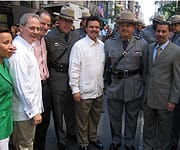Life Extension Magazine®
It was a chilly morning on November 7, 1999, when Sen. David A. Paterson lined up to run the New York City Marathon. Although he had never run more than six blocks in his life, the senator representing New York’s 30th district agreed to enter the famous race for the Achilles Track Club, a running organization for the disabled with branches all over the United States. Sen. Paterson is legally blind, but considered himself to be a good athlete despite his lack of running experience and impaired vision. Remarkably, Sen. Paterson completed the marathon, attributing his performance and abundant energy to a program of nutrition and dietary supplements he had begun to prepare for the race. Convinced that the diet, supplements, and other lifestyle changes were dramatically improving his health, he decided to begin a physician-monitored prevention and wellness program. This is how he met Dr. Eric Braverman, a physician based in New York City. Shortly after hearing Dr. Braverman’s radio program Total Health while driving back from Albany, he visited Dr. Braverman’s office as a patient. Dr. Braverman soon learned that the senator had not always put much stock into nutritional supplements and dietary changes. In fact, Sen. Paterson used to consider most things outside traditional medicine to be “snake oil.” However, after friends sparked his interest in alternative health choices, he intensively researched supplements, nutrition, and preventive health. What Sen. Paterson learned not only influenced his personal health choices, but also helped determine his political health care agenda. He credits his transformation in part to Dr. Braverman, whom he describes as the most thorough, effective doctor he has ever had. Sen. Paterson discovered that politics and health issues mix in ways he had not suspected, often to the detriment of the citizens of New York State and America as a whole. Incorporating Dr. Braverman’s PATH program and life extension models in his personal health program, he experienced firsthand the life-changing benefits of a healthy lifestyle. As a New York State senator—and now candidate for lieutenant governor of New York—Sen. Paterson has decided to campaign for a healthier lifestyle for all citizens of New York. Responding to the rapidly growing epidemic of childhood obesity in New York, he held a press conference in June to announce his support of Dr. Braverman’s vision of a “culture of health” and his plans to expand this concept and make it a central part of his campaign platform. “I believe that most people in this country are seeking alternatives to traditional medicine and want to learn more about prevention and wellness,” says Sen. Paterson. “But the public is being denied information that would help it make good health choices, and I want to change that.” Sen. Paterson is outspoken about bringing health freedom to the public’s attention and to the forefront of political discourse. “What our society needs most is to stop being influenced by partisan interests and to start openly and independently reviewing ideas for a better health culture,” Sen. Paterson says. “The best way to do that is to publicize the discussion. That’s what I’m trying to do.”
Sen. Paterson, a frequent speaker at public events and before various organizations, now brings up health issues in many of his talks, though his views are not always well received. He recalls being chastised by several physicians after one such talk for discussing alternative treatments for AIDS. He also recently appeared at a news conference called to protest the most recent veto of legislation to expand stem cell research. But he is not swayed by opposition or stopped by obstacles, though that has not always been the case. A History of Overcoming ObstaclesAt 18, young David Paterson tried to get a summer job with a catering service near his Long Island home, but was the only one among his friends not hired due to his sight disability. Frustrated and angry, he set out to show that hard work could eventually overcome such obstacles. Yet even as a dean’s list student at Columbia University, he suffered discrimination and his frustrations continued to grow. In just one semester, he went from the dean’s list to flunking out. Although the school decided to give him another chance, he temporarily left his studies on a professor’s advice. “He told me bluntly that I didn’t stand up for myself enough, that I had no defenses when things went wrong,” Sen. Paterson recalls. “He told me to go out and get a job and fight for that job, then come back and finish college. So I did that, getting a job at a credit union. It was a painful time for me. I’d graduated high school younger than everyone and was legally blind, yet I figured I’d be out of college at age 20. But it all came crashing down.” Taking time to work and learning to fight for himself paid off. He returned to finish his undergraduate degree, then went on to law school at Hofstra University. He worked as an assistant district attorney and in other public service positions before being elected the youngest state senator in New York’s history. “I have proven to myself over the last 30 years that I can be stalled and injured, but when I have a mission, I get back up and I continue it,” he says. “In the end, success is getting up one more time than you got knocked down. Sticking to the mission gets me through. Working for a culture of health is a new mission for me, and I intend to see it through.” Calling for Informed Health ChoicesThe senator has no doubts that this mission will be an uphill battle. Far from living in a culture of health, our society has degraded to an unhealthy culture, he says. Seeking answers as to how our unhealthy culture developed, Sen. Paterson’s research turned up a recurring theme: the powerful sway of political influence, over everything from how pharmaceuticals are prescribed and what constitutes a healthy diet to conflicts of interest in medical research funding. It made him realize that as a politician, he could possibly exert some influence of his own.
“I learned, for example, that the idea of three square meals with eggs, meat, white bread, and starch was lobbied to the FDA in the 1950s,” he explains. “It became the way we eat not because of its health value, but because of political clout. It was organized activity that promoted these health hazards to the status of dietary necessity. But I think that this clout could be diminished by the same type of organizing, only based on scientific evidence rather than political influence. I maintain that there can be a change in the diet culture that will change peoples’ lives.” But political interests get in the way, he says, as in the case of the proposed legislation that would force European standards on US food and supplements. The senator believes that if the public were allowed to know more about the curtailment of choice in the health field, it would rebel against such decisions. “I want a fair hearing for responsible people who offer us different ways to keep our society healthy,” Sen. Paterson says. “The public now spends billions of dollars a year on alternative products and treatments. People have spoken and are voting with their dollars, saying emphatically that individuals know better than anyone else with regard to their own health choices. But they need good information to make those choices.”
Finding Common Ground and a New AgendaBelief in informed health choice forms a common ground in the highly diverse 30th district that Sen. Paterson represents. The district covers Harlem, East Harlem, and Manhattan’s Upper West Side, or, as Sen. Paterson describes it, “a famous white neighborhood, a well-known Hispanic neighborhood, and probably the most famous black neighborhood.” All parts of the district are experiencing the consequences of an unhealthy lifestyle, he says. Harlem, where the senator lives with his wife and two children, has an asthma rate that is five times what it was when he was first elected to the state senate in 1985. His own 11-year-old son has asthma. The teenage population all over his district is suffering from obesity and other health problems. Diabetes has skyrocketed among children and adolescents. “Yet we seem to just prattle along and not recognize the poor quality of life that we’re visiting on our children and are accepting for ourselves,” Sen. Paterson says. “But even in this diverse district, we have common ground. Very conservative people who believe in the right to privacy support alternative health choices, and liberals who support individual freedoms come to the same conclusion. But dead in the middle is a vast institutional thinking in this country that blocks any new thought on creating a culture of health, one where we think first of prevention and preservation of the human body.” The senator believes the government must embrace prevention, lest the current epidemic of preventable diseases bankrupts the nation. Prevention can be less costly in the long run, he says, but the problem is the insurance industry’s cozy relationship with drug companies and the federal government itself. While prescription drugs are necessary in modern medicine, Sen. Paterson feels such drugs are being handed out like candy. “Drugs have their uses, but I think they’re too readily prescribed for any condition,” he explains. “The cholesterol issue is an example. The standard medical community has embraced cholesterol as the cause of heart disease. Yet studies belie this notion and we can’t explain the significant percentage of people with normal cholesterol levels who die of heart attacks. Ignored are testing of homocysteine levels and the use of fish oils, folic acid, and B vitamins, all of which combat heart disease. This should really be the direction of treatment, but it always seems that when a remedy doesn’t involve drugs, interest in promoting the remedy wanes.” Pharmaceutical companies are also too close to medical education for Sen. Paterson’s comfort. He trusts that while most medical professionals are sincere and well intentioned, doctors who work on the basis of drug company-sponsored research results present a conflict of interest. “There is a notion of conflict impinging upon almost every diagnosis and every treatment that we receive daily,” he says. “The wrong interests have gained political power in our medical review institutions.”
Need for New Public PolicyThe insurance industry should be reformed to reward those who lead healthy lifestyles, Sen. Paterson says. People could receive insurance credits for demonstrating that they are living healthier lives. Other reforms would be directed at outlawingvending machines in schools and limiting advertising for alcoholic beverages and junk food: “Our government should invest in public service announcements about alternatives, showing what happens to people who drink too much, use street drugs, and eat too much sugar. It’s all part of getting information to the people.” Good public policy should create and promote a culture of health, especially for children, says Sen. Paterson. He craves a stronger role in creating such policy. While others have turned a blind eye to the influences that have created our unhealthy culture, Sen. Paterson’s vision is quite clear. “It’s time for this country to wake up from its coma and recognize how horribly we have let our health care system deteriorate, how our priorities are totally out of order,” he says. “I don’t necessarily know the answers. I just want a free hearing for other points of view and to let them be judged on their merits, not tainted by interests that are aligned more with profit making or censoring science, thought, and opinion. It’s time for things to change.” |




